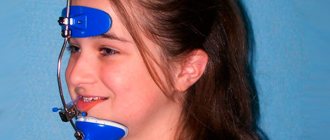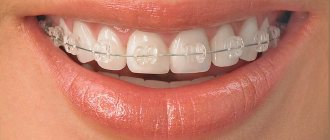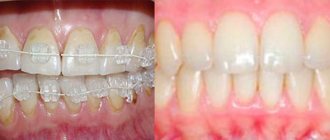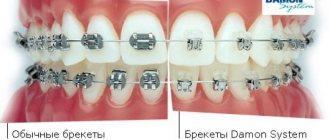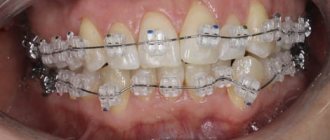Orthodontic treatment gives the best results in childhood. It is easier to correct malocclusion in children, since their jaw and teeth are just developing. However, this does not mean that braces are contraindicated for adults. They can be installed even after 30 years, but the treatment process will be longer. Let's consider its features.
The formation of the dental system ends around 17-18 years, but a child’s permanent bite is formed by 12-13 years. It is best, according to dentists, to install braces at the age of 10-12, when the last molars grow.
In this article
- Should I get braces after 30?
- In what cases should you get braces after 30 years?
- When should you not get braces at 30?
- Braces at 30: features of installation and wearing
- Which braces are best for people over 30?
- How to install braces for adults
- Does it hurt to wear braces?
However, it all depends on individual characteristics. Sometimes doctors suggest waiting a bit for the jaw to form without braces. And in some cases, on the contrary, their immediate installation is required. The need for such treatment is determined primarily by medical indications, and only then by the patient’s wishes.
Should I get braces after 30?
Many people believe that installing braces after 30 years is pointless, dangerous or painful, so they refuse orthodontic treatment. However, it is worth understanding that malocclusion, which can develop in various forms, can cause many complications. Among them:
- Caries, gingivitis and other oral diseases that occur due to poor hygiene and uneven distribution of chewing load.
- Pain in the jaw, which can radiate to the temples and eyebrows, which is a consequence of compression of the nerves and joints.
- Rapid wear of some teeth, abrasion of enamel, loss of teeth.
- Diseases of the gastrointestinal tract due to poor chewing of food.
- Psychological problems associated with self-esteem and complexes that an ugly smile gives rise to.
Let's consider the indications for which braces are placed even after 30 years.
Price issue
The financial side of the course of treatment is directly related to the type of braces chosen. The total cost consists of such components as the material used to make the structure, the place and method of fastening, and the actions of the doctor.
In the proposed table, you can study the approximate price of each previously discussed system and find out the total cost of treatment, taking into account all preparatory procedures and control visits.
| Type of correction device | Cost, thousand rubles. | Total cost of treatment, thousand rubles. |
| Non-ligature braces | from 20 | up to 70 |
| Lingual system | from 45 | up to 110 |
| Ceramic braces | from 30 | up to 160 |
| Sapphire design | from 45 | up to 200 |
| Aligners (set of 10 pcs.) | from 25 | up to 150 |
All indicated figures may change upward or downward, based on the pricing policy of the clinic, its location and status, the qualifications of the doctor, etc.
In the video, a current dentist will complement the information presented above.
In what cases should you get braces after 30 years?
The reason for installing braces at any age is an incorrect bite, which can manifest itself in different ways. Typical signs of this dental problem:
- crowding of teeth and their creeping onto each other;
- large interdental spaces;
- tooth growth to the sides;
- excessive protrusion of one jaw forward;
- large distance between the upper and lower rows of teeth;
- shifting the jaws sideways in opposite directions.
These anomalies are not always noticeable to the naked eye. In some people they are hidden, but at the same time they cause severe discomfort, for example, while eating. In this regard, many refuse to wear braces, getting used to this discomfort. However, it is recommended to undergo orthodontic treatment even in cases where there are malocclusions, but there is no visible aesthetic defect.
Reaching a new goal
Perhaps you are faced with a difficult choice: on the one hand, you are embarrassed about your smile, on the other, you do not want to wear braces for 1 to 3 years. But the faster you start, the faster you finish. As they say, the best time to do this is yesterday, the second best time is today. Moreover, you will experience great joy as you systematically move towards your goal, seeing how your teeth are straightened month after month, and in the end you will get the long-awaited result - a beautiful smile. This experience will certainly be useful in other areas of life.
When should you not get braces at 30?
There are several more restrictions for installing braces at the age of 30 and later than contraindications for orthodontic treatment in childhood. This is due to the fact that the dental system has already been formed and some defects are difficult or even impossible to correct.
In addition, adults may have crowns or fillings in their mouths that interfere with the placement of orthodontic braces. There are other restrictions. In most cases they are relative:
- serious anatomical changes in the jaws;
- severe wear of crowns;
- the presence of carious cavities and old fillings;
- some diseases of the nervous and cardiovascular systems.
There are few absolute restrictions: HIV, tuberculosis, very weak immunity, etc. Before installing braces in adulthood, longer preparation is required. In general, the process of treating malocclusion in children and adults is practically no different. There are only a few nuances.
Adult systems
The modern market has a wide range of designs that differ in material, location and method of fastening. When selecting a corrective device model for an adult, paramount importance is given to the characteristics of the clinical case and his personal requirements.
Unligated
In orthodontics, non-ligating (self-ligating) braces are an improved model of the classic version of the corrective apparatus. From the name it is clear that these designs do not have ligatures - a wire or rubber element connecting the power arc to the locks.
Unlike classic models of braces, in ligature-free systems the arch is secured using special clips or locks with caps, which means it is not rigidly fixed in the grooves of the plates, and “slides” freely in them.
This change reduced the force on uneven teeth. Correction of problem units is more delicate, gentle and natural. They move to the correct position without additional load.
Dental correction occurs by stimulating the work of the periodontal muscles. A “synergy effect” is created when the result consists of the joint activity of the soft tissues of the oral cavity and the orthodontic device.
Based on design changes, the systems are endowed with the following advantages:
- the number of follow-up visits to the doctor and the duration of the course are reduced;
- the likelihood of developing complications is reduced through the use of passive ligation;
- the quality of everyday hygiene improves;
- treatment is more comfortable, thanks to the exquisite design, small size and smooth external profile;
- the oral mucosa and soft tissues are not injured;
- there is no discomfort and pain due to reduced pressure on the teeth;
- the appearance is more aesthetic.
Non-ligature devices have only one drawback - high cost when compared with classic corrective devices. This fact is explained by the complexity and specificity of the working mechanism. In addition, due to its greater complexity, the system cannot be installed in all clinics.
To make models, materials are used that do not react with salivary fluid, namely: ceramics, metal, sapphire, composite.
It is important to note that the duration of treatment with the structures under consideration is on average 25-30% lower than the period of correction with classical devices.
Lingual
Lingual braces are those that are attached to the teeth on the lingual side. Their appearance made a revolution in orthodontics, eliminating the main disadvantage of classical structures - visibility to others.
The advantages of lingual braces are the following:
- absolutely invisible to others;
- when creating, 3D modeling technology is used, when the result of the correction can be seen even before it begins;
- the doctor can make adjustments at any stage of treatment;
- successful treatment of complex cases of malocclusion;
- short adaptation period.
There are also disadvantages, namely:
- complex and lengthy installation process;
- oral hygiene becomes more difficult;
- during the adaptation period there is discomfort, problems with speech, with eating;
- it is necessary to visit the orthodontist frequently;
- high cost of the system.
Important: the installation of the devices in question is contraindicated in cases of severe crowding of the frontal units, low coronal parts, or problems with the mandibular joint.
Correction with internal braces takes about 20-30% longer than with conventional braces.
Ceramic
Structures made from ceramics are classified as aesthetic products. They are practically invisible on the teeth, since the shade of the material is selected in accordance with the tone of the enamel coating.
Installation shown if available:
- simple occlusion defects;
- distortions of facial features caused by incorrect closure of the jaw arches;
- incorrect placement of one or a small group of teeth in a row;
- speech defects associated with malocclusion.
The advantages include the following indicators:
- The result is stable.
- Sufficient reliability of the entire structure.
- The likelihood of damage to tissues and mucous membranes is minimal.
- There is no need to visit the doctor frequently.
- Good aesthetic characteristics.
- The adaptation period is short.
Despite their popularity, the devices have a number of disadvantages that are important to consider:
- They require careful wearing , changes in diet, and breaking the habit of certain habits due to the insufficient strength of ceramics (if the material is compared with metal).
- Treatment takes longer than with metal devices.
- High price.
Ceramic devices are usually installed for a period of 2-2.5 years (based on the patient’s age and the severity of the defect).
The first results can be visually assessed after 2 months. from the date of placement of braces.
Sapphire
This is a type of system for the manufacture of which an artificially grown sapphire crystal was used. Essentially, this material is a single crystal of aluminum oxide. Sapphire is hypoallergenic and absolutely safe for humans.
In design and operating principle, sapphire models are identical to classic devices made from other materials. Designs are prescribed for simple malocclusions and tooth position.
Important: sapphire models are more suitable for patients with a white enamel coating. With a naturally yellowish tint, the aesthetics of the structure are reduced due to its visibility on the teeth.
Advantages:
- Durability exceeds that of ceramic models.
- High aesthetic characteristics.
- They do not rub the mucous membrane, do not injure enamel and soft tissues.
- Easy to install.
- Sapphire parts do not become cloudy over time and are resistant to food coloring.
- After removing the structure, no traces of presence are found on the enamel.
- During the period of adaptation, the manifestations of pain and discomfort are insignificant.
- The correction efficiency is high.
A significant disadvantage of these braces is their high cost. Models are more expensive than metal and ceramic ones. In addition, sapphire is not strong enough, so there is a risk of breakage if the operating rules are not followed.
Corrective devices made of sapphire are installed for a longer period than analog products made of other materials. The average time to correct a simple defect is 1 year.
Braces at 30: features of installation and wearing
Getting braces at age 30 is not dangerous or painful, but orthodontic treatment in adulthood is not without difficulties. Often people encounter the following problems:
- Long preparation and treatment. Before installing orthodontic structures, all dental diseases must be cured. In adults there may be more of them than in children, so the preparatory stage of treatment can last for several weeks. Many people are interested in how long they need to wear braces if they are installed after 30 years. As practice shows, even minor defects require at least a year to eliminate; sometimes you have to wear braces for 2-3 years.
- It may be necessary to remove some teeth, often figure eights, to create space for the remaining teeth once they are straightened.
- In some cases, it is necessary, on the contrary, to install or replace additional structures, for example, crowns on which the braces will rest.
- It will take a long time to consolidate the result with the help of special means and instruments, otherwise the teeth may return to their original position. This often happens with significant defects.
In other words, an adult who wants to correct an overbite will have to be patient. The treatment will be long, but, according to people who have undergone it, it will be effective and justified.
How to straighten a child's teeth
In modern orthopedic dentistry, several methods are used to correct dental anomalies in children. You should contact an orthodontist at the age of 3-4 years. The doctor will be able to recognize abnormalities if they exist. An abnormal bite is treated by keeping the teeth in the correct position.
Braces are often used for correction. Special orthodontic locks are glued to the enamel surface and secured with an arch. They gradually shift the dentition into the correct position.
Also used:
- Trainers are the most gentle method, they are made of silicone and are put on both jaws. If you use trainers daily, the treatment period is up to 1.5 years;
- plates that correct bite - there are removable and non-removable plates; they are made of plastic with metal wire inserts; removable structures can be removed during meals and oral hygiene.
During the consultation, the orthodontist determines the possibility of straightening without braces. Alternative methods can be used when the patient is allergic to metal, when the gums are low, the whole row is not curved, that is, only 1-2 teeth are incorrectly positioned. Aligners cope with almost all occlusion defects. They allow treatment to be carried out comfortably and quickly.
Which braces are best for people over 30?
There are many varieties of brace systems, which differ from each other in a number of indicators: material of manufacture, strength, aesthetic properties, reliability of fixation, etc. As a rule, the orthodontist offers the patient several types of structures to choose from. When choosing braces, consider the following factors:
- Profession. A person who has to speak in public or often communicate with people can choose plastic, ceramic or sapphire braces: they are almost invisible to others. Lingual systems that are installed on the inner surface of the dentition are also well suited.
- The degree of bite pathology. Severe forms are better corrected with metal staples. In addition, they provide faster correction compared to plastic and ceramic structures.
- Price. The most expensive braces are made from sapphire, and ceramic products are also expensive. If you want to save money, but not at the expense of treatment, choose metal or plastic staples.
- Physical limitations. Lingual braces are more difficult to maintain. For people with disabilities, if they cannot fully care for their oral cavity, it is better to opt for vestibular structures.
But the main factor that determines the choice of braces is medical indications.
People around you start to envy you kindly
Not many people can boast of a perfect smile, but only a few take on this problem. However, braces on an adult are causing others to think about going to the dentist again. Yes, people around you will pay attention to you more often; friends and acquaintances will begin to be interested in the details of the treatment, the sensations, and the cost of the design. One thing is for sure - they will respect you, because you care about your health and did what many do not dare to do. In addition, not everyone is ready to shell out more than 100 thousand rubles to correct their smile.
How to install braces for adults
Regardless of which system will be installed for the patient, he first undergoes an examination, during which indications and contraindications are determined. The main research method is radiography, which allows you to take pictures of the jaws and make impressions based on them. Next, the oral cavity is sanitized: treatment of dental diseases and ultrasonic cleaning. If necessary, extra teeth – molars or “eights” – are removed.
After preparation, the bracket system is installed. This is done according to the following algorithm:
- teeth are cleaned of plaque, saliva is removed, and the oral cavity is dried;
- the enamel is treated with a special solution, which makes it more susceptible to glue;
- An adhesive composition is applied to the surface of the tooth crown, and cement is applied to the bracket lock;
- the clasps are fixed on the teeth, after which they are dried with an ultraviolet lamp;
- excess glue is removed with a solvent;
- An arch is threaded into the braces, which corrects the bite by applying pressure to the jaw.
Installation can be direct or indirect. In the first case, each clasp is glued to one tooth; in the second, the dentist creates a structure on a mock-up of the jaw, and then transfers it to the patient’s oral cavity.
The arc has a memory effect and gradually begins to return to the shape that was given to it during the modeling of the structure. Due to this, tooth displacement occurs. Periodically, the arch is tightened to increase pressure on the dentition. This continues for 1-3 years, it all depends on the success of the treatment.
Choosing the optimal correction method and alternative to braces
An experienced dentist will always find a way out of this situation. For adults, dentists recommend:
- Metal devices even with minor defects, as these designs are highly efficient.
- For those who are not ready to flaunt their treatment, aesthetic braces are suitable. Colorless sapphire devices look stylish, ceramic designs look good. Lingual appliances are fixed on the inside of the crowns, so they are not visible to others at all.
- Self-ligating systems are capable of stimulating cellular activity without disrupting the blood supply to tissues. This improves the condition of the periodontium and minimizes the risk of complications. The use of weak forces will help to avoid removing units when there is a large shortage of space. Non-ligature designs simplify care and increase hygiene.
When choosing a device, the severity of the anomaly should be taken into account. This issue can only be resolved correctly by a dentist after a thorough diagnosis. If the defects are minor, transparent aligners are used. They are worn at least 20-22 hours a day. Removable structures include lumineers, veneers, plates, and compositers. Trainers are also used, which look like hard, thin wire. They are used to consolidate the effect of bite correction.
Does it hurt to wear braces?
Before installing orthodontic structures, people often wonder if it hurts to put on and wear braces. Painful sensations during the procedure occur only with increased sensitivity of the gums and teeth. To relieve the patient of discomfort, the doctor may give an anesthetic injection.
Pain during wearing braces usually only bothers you during the adaptation period, that is, in the first 5-15 days. If you do not eat hard foods, the pain will be mild. Pain medications are rarely needed.
For treatment to proceed without complications, the patient needs to change his diet and carefully monitor hygiene. You will have to limit yourself in the use of certain products and purchase special products for cleaning the oral cavity: a toothbrush with V-shaped bristles (CURAPROX Ortho), a brush (Biorepair Scovolini Interdentali Cilindrici), dental floss (Mirafloss implant chx), rinses (Biorepair Mouthwash) and irrigator (Little Doctor International Ltd Aquajet LD-A7, Donfeel Donfeel OR-820D Compact). You will need to see your doctor every few months to have the archwire tightened.
In general, it is safe to get braces after 30 years of age. However, they often have no alternative, so they will have to choose: either not try to solve the problems caused by malocclusion, or be patient a little and get a healthy and beautiful smile.
General conclusion
- 1. There is no universal way to correct a bite without the help of braces.
- 2. Each of the alternative methods may not be suitable in a particular clinical case.
- 3. Do not try to correct your bite on your own; be sure to have a personal consultation with an orthodontist!
To make a decision, contact our clinic with highly qualified orthodontists. Make an appointment with us for a consultation or call. Our clinic is located at St. Petersburg, Thorez Ave., 95.
Posted by:

